Instead of consuming a huge amount of gas, you can solve all your boat energy problems with the best marine solar panel. Maintaining your battery charged is a never-ending issue for boaters. The electrical requirements for lighting, audio system, and maybe a fridge to keep your drinks cold always drain the batteries.
The marine solar panel reviews we prepared will offer you insight into what you can currently find on the market in terms of top-rated products in this line, and we even prepared a buyer’s guide to help you find a great model that fits your vessel well.
See The Quick Comparison Chart
Benefits Of Marine Solar Panels
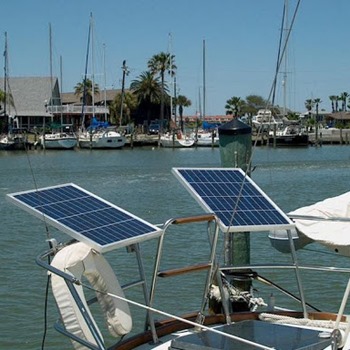 Your boat cannot function without a deep cycle marine battery, if that is the type of vessel, but a solar panel is not mandatory. You use it if you feel you need it. Therefore, let us see what benefits you can have if you decide to use such an item.
Your boat cannot function without a deep cycle marine battery, if that is the type of vessel, but a solar panel is not mandatory. You use it if you feel you need it. Therefore, let us see what benefits you can have if you decide to use such an item.
First, if you attach the panel to the boat’s electrical system, a lot of fuel will be saved. You no longer have to keep the engine running so your battery does not die on you.
Besides being very easy to maintain, a solar panel can save you in the unfortunate situation your engine breaks down and you remain without any power.
Marine solar panels are eco-friendly because they use renewable energy. If you are an environmentalist, you can do your part in saving the planet by using this type of energy.
Moreover, these panels can save you energy and time, and they can also be used to power small devices on board.
Drawbacks Of Marine Solar Panels
Even though they bring a lot of advantages, there are some things related to marine solar panels that might make you think twice if you want to use them or not.
For example, these units take up space. If you do not have a large boat, you might have issues with space. Therefore, adding such a device would make things even more complicated.
Another major drawback is the sunlight’s availability. You depend on the sun because, without it, there is no energy either. That is why it would not be a bad idea to have a marine battery charger, just in case.
While this might not be an issue for some, you need to know that energy storage is quite expensive. Actually, the entire solar panel system is costly.
Best Marine Solar Panels Comparison Chart
| PRODUCT | DETAILS | ||
|---|---|---|---|
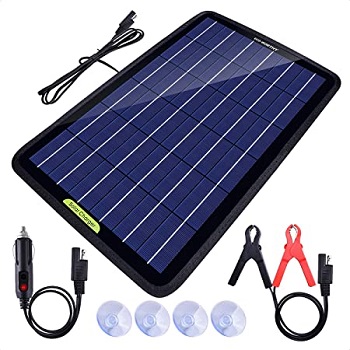 | ECO-WORTHY 12 Volts 10 Watts Portable Solar Panel for Boats |
| View On Amazon |
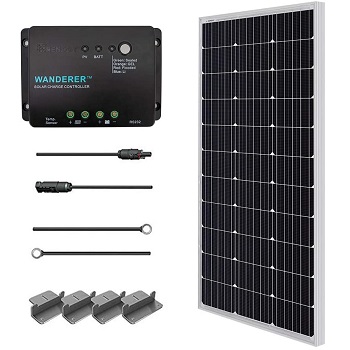 | Renogy 100 Watts 12 Volts Monocrystalline Solar Starter Kit |
| View On Amazon |
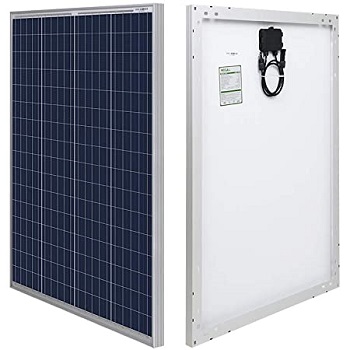 | HQST 100 Watt 12 Volt Polycrystalline Solar Panel Power for Boats |
| View On Amazon |
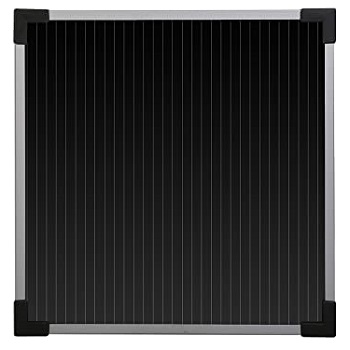 | Sunforce 50022 5-Watt Solar Battery Trickle Charger |
| View On Amazon |
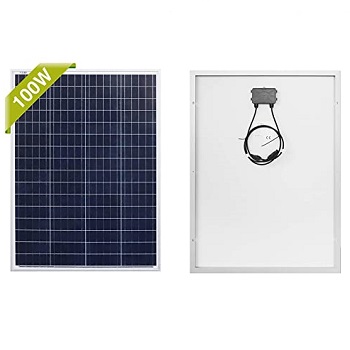 | Newpowa 100 Watts 12 Volts Polycrystalline Solar Panel Marine |
| View On Amazon |
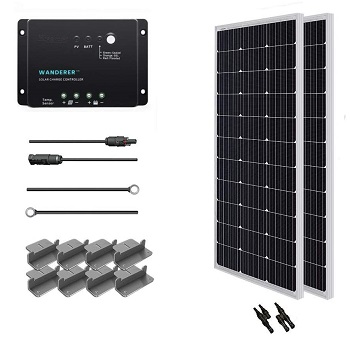 | Renogy 200 Watt 12 Volt Solar Starter Kit with Wanderer |
| View On Amazon |
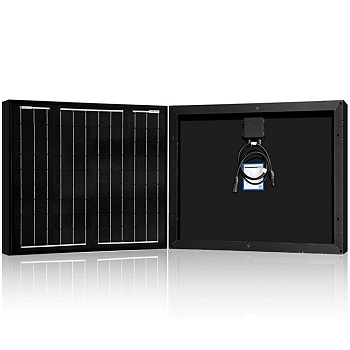 | ACOPOWER 50W Mono Solar Panel 12V for Battery Charging |
| View On Amazon |
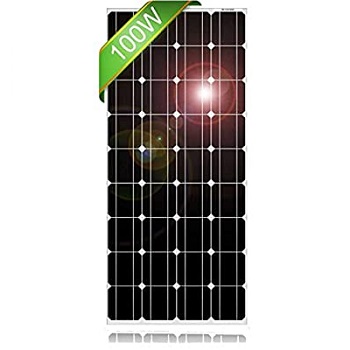 | DOKIO 100 Watt 12V Solar Panel Marine Boat Off Grid |
| View On Amazon |
Best Marine Solar Panels Reviews
1. ECO-WORTHY 12 Volts 10 Watts Portable Solar Panel for Boats
 Since the product is 10W 12V it is more suitable for a smaller boat. Moreover, it is extremely lightweight as well as easy to mount. The ECO-WORTHY 12 Volts 10 Watts Portable Solar Panel for Boats has a high-module conversion efficiency.
Since the product is 10W 12V it is more suitable for a smaller boat. Moreover, it is extremely lightweight as well as easy to mount. The ECO-WORTHY 12 Volts 10 Watts Portable Solar Panel for Boats has a high-module conversion efficiency.
Thanks to its bypass diodes, the power drop generated by shade is minimized. The panel provides a decent overall performance even in low-light conditions. This model is shockproof, dust and rust-resistant, as well as environmentally-protected. The unit comes with pre-drilled holes on its backside which allow you to mount it securely and quickly.
In order to prevent discharge, the panel is equipped with a blocking diode. This unit can charge 12V batteries and it requires very little maintenance. This is not a very small but long extremely large, measuring 8.7 by 13.9 inches. With this size and power, it is not a good option for large vessels.
Pros
- Since it only weighs 1.50 pounds, the unit does not affect the boat’s balance in any way
- It is also portable
- The panel can also be used to charge other vehicles such as motorcycles or snowmobiles
Cons
- Strong wind may pose a few problems to this model
2. Renogy 100 Watts 12 Volts Monocrystalline Solar Starter Kit
 This Monocrystalline Solar Starter Kit delivers quite an impressive value for powering your vessel. The charge controller that comes in the kit is an upgraded device of the manufacturer that allows you to expand your power system up to 400 W. The kit also includes an eight-foot tray cable that enables you to connect the unit with your battery.
This Monocrystalline Solar Starter Kit delivers quite an impressive value for powering your vessel. The charge controller that comes in the kit is an upgraded device of the manufacturer that allows you to expand your power system up to 400 W. The kit also includes an eight-foot tray cable that enables you to connect the unit with your battery.
The Renogy 100 Watts 12 Volts Monocrystalline Solar Starter Kit has a great output of 500W per day. It can charge a 50Ah battery in less than three hours. Moreover, the charge controller can be used on any vehicle that uses battery negative on the chassis.
In the same package, you will get adaptor kits, mounting brackets, and cables, alongside the actual marine solar panel. Basically, once you get this kit, you do not need to purchase any other accessories because you get everything you need. This also saves you time and money.
Pros
- Due to the high-quality materials, this unit cannot be damaged very easily
- You can use this panel to power more devices at the same time
- The frame is made of corrosion-resistant aluminum for extended use
Cons
- The cables are low-grade, so you might want to get marine-grade ones
3. HQST 100 Watt 12 Volt Polycrystalline Solar Panel Power for Boats
 The HQST 100 Watt 12 Volt Polycrystalline Solar Panel Power for Boats is another option that is worthy of your attention. Even if it is a bit cheaper than some of our other picks, this panel is just as durable and it is capable of withstanding winds of up to 2,400 Pa. Since it is a marine solar panel, the unit has an IP rating of 65 for water resistance. This ensures that the product can be efficient even in the harsh conditions found in the marine environment. Moreover, the panel has pre-drilled holes which makes the installation process quick and also easy. If you have a bigger boat and need to use a series of these panels, you will notice that they have very high efficiency. This makes this product a great choice for high-wattage applications, being able to power most of your vessel’s electronics throughout the entire day.
The HQST 100 Watt 12 Volt Polycrystalline Solar Panel Power for Boats is another option that is worthy of your attention. Even if it is a bit cheaper than some of our other picks, this panel is just as durable and it is capable of withstanding winds of up to 2,400 Pa. Since it is a marine solar panel, the unit has an IP rating of 65 for water resistance. This ensures that the product can be efficient even in the harsh conditions found in the marine environment. Moreover, the panel has pre-drilled holes which makes the installation process quick and also easy. If you have a bigger boat and need to use a series of these panels, you will notice that they have very high efficiency. This makes this product a great choice for high-wattage applications, being able to power most of your vessel’s electronics throughout the entire day.
Pros
- The bypass diodes reduce the impact of shade on the panel
- It can handle stronger winds quite well
- The unit also has a high module conversion efficiency
Cons
- A controller is not included so you will have to get one separately
- The cables are shorter than you might like
4. Sunforce 50022 5-Watt Solar Battery Trickle Charger
 In case you are looking for a budget-friendly alternative, you should take a look at the Sunforce 50022 5-Watt Solar Battery Trickle Charger. These panels are lightweight and small, making them ideal alternatives for small boats.
In case you are looking for a budget-friendly alternative, you should take a look at the Sunforce 50022 5-Watt Solar Battery Trickle Charger. These panels are lightweight and small, making them ideal alternatives for small boats.
Moreover, their compact and lightweight design allows you to use multiple panels in varied configurations anywhere on your vessel. This way, you will be able to charge small electronics, without having to turn on the engine. These panels feature aluminum frames and are built to be 100% waterproof.
However, since the power from this thin-film unit does not scale well, it is difficult to achieve high power output. Still, charging 12-volt batteries is not an issue for this marine solar panel. The package includes a 12V DC plug, battery clamps, as well as mounting hardware which makes the installation process quick and easy. What is more, the panel works well in all daylight conditions, even if it is cloudy.
Pros
- This is an excellent option for powering less-damaging small devices
- The unit has a built-in discharge/overcharge protection
- It can be used for charging various types of batteries from different vehicles
Cons
- Thin-film cells usually wear out after about ten years
- If you want to scale up power using these panels, it will be expensive
5. Newpowa 100 Watts 12 Volts Polycrystalline Solar Panel Marine
 This manufacturer is known for producing a wide range of solar panels for boats, RVs, as well as home units. This model has a maximum power output of 100 watts and also comes with a 25-year transferable power output warranty.
This manufacturer is known for producing a wide range of solar panels for boats, RVs, as well as home units. This model has a maximum power output of 100 watts and also comes with a 25-year transferable power output warranty.
For increased durability, the cells of this solar panel are encapsulated in EVA, thus providing excellent performance. The Newpowa 100 Watts 12 Volts Polycrystalline Solar Panel Marine are framed with anodized heavy-duty aluminum which offers extra rigidity. Compared to other similar products, this unit delivers high wattage at a lower price.
Even though it offers a high level of power, it is smaller than other similar alternatives. This means that this model is also suitable for smaller boats. Moreover, the unit can handle high winds of up to 2,400 Pa, as well as snow loads of up to 5,400 Pa. This means that you can mount them on your boat with no worries.
Pros
- The diodes are preinstalled in the junction box
- You will also get a pair of three-foot MC4 cables that are already attached
- Compared to many other brands, this model provides a higher cell efficiency
Cons
- The attached cables might be a bit too short for certain applications
6. Renogy 200 Watt 12 Volt Solar Starter Kit with Wanderer
 This kit is an excellent option for people looking to get started in solar energy. The unit is great for off-grid applications like boats RVs, trailers, and even sheds and cabins. The Renogy 200 Watt 12 Volt Solar Starter Kit with Wanderer offers multiple benefits including grid independence and quiet power production.
This kit is an excellent option for people looking to get started in solar energy. The unit is great for off-grid applications like boats RVs, trailers, and even sheds and cabins. The Renogy 200 Watt 12 Volt Solar Starter Kit with Wanderer offers multiple benefits including grid independence and quiet power production.
It is a complete kit that contains everything you need to get started. You will get two 100 W marine solar panels, a 30A PWM Wanderer charge controller, a 20-foot 10AWG MC4 adaptor kit, an 8-foot 10AWG tray cable, two sets of Z-brackets, and a set of MC4Y connectors.
The negative grounding controller offers protection against battery overcharging, reversed, short-circuit, as well as over-discharging and charging. All these protective features ensure safety as well as wider off-grid applications. Basically, the unit can be used on any vehicle with battery negative on the chassis.
Pros
- This kit contains everything you need to get the installation process started immediately
- The system can be expanded to a maximum of 400 Watts
- It can fully charge a 50Ah battery from 50% in only one hour and a half
Cons
- The controller is not very performant, you might want to get a different model
7. ACOPOWER 50W Mono Solar Panel 12V for Battery Charging
 This option features monocrystalline technology that allows you to obtain maximum efficiency from solar energy. Thanks to its design, the product takes less space. At the same time, it provides more productivity if you compare it to a polycrystalline counterpart.
This option features monocrystalline technology that allows you to obtain maximum efficiency from solar energy. Thanks to its design, the product takes less space. At the same time, it provides more productivity if you compare it to a polycrystalline counterpart.
Due to its construction that contains only high-quality materials, the ACOPOWER 50W Mono Solar Panel 12V for Battery Charging is also extremely durable but also reliable. The installation process is straightforward, as it is a ready-to-install product. The pre-drilled holes make things much easier in this sense.
The unit features high module conversion efficiency with a power of 50W. The panel comes with a 12AWG cable with MC4 quick connectors. This unit is suitable for marine use but also for RVs, cars, caravans, as well as green-house solar systems. Moreover, the unit can withstand strong winds of up to 2,400 Pa, as well as snow loads of up to 5,400 Pa.
Pros
- The unit has an anodized aluminum frame and anti-reflection coated glass
- It is waterproof with an IP65 rating
- Thanks to its rugged design, the unit is extremely sturdy and durable
Cons
- The charge controller needs to obtained separately, as it is not included in the package
8. DOKIO 100 Watt 12V Solar Panel Marine Boat Off Grid
 This model is large and an excellent choice for larger boats, where they can be mounted permanently. Speaking of mounting, these panels have pre-drilled holes that allow you to quickly and easily install and secure them. Once the panels are installed, you do not have to worry about any shifting around, thanks to the high-quality design.
This model is large and an excellent choice for larger boats, where they can be mounted permanently. Speaking of mounting, these panels have pre-drilled holes that allow you to quickly and easily install and secure them. Once the panels are installed, you do not have to worry about any shifting around, thanks to the high-quality design.
Moreover, the frame is corrosion-resistant which makes it ideal for marine use. In order to reduce the size, the panel is incredibly thin but not less performant than other similar units. For this reason, the DOKIO 100 Watt 12V Solar Panel Marine Boat Off Grid is maneuverable and lightweight. This marine solar panel has a very high amp rating.
Not only is it perfect for a larger boat, but it can also charge multiple electronic devices at the same time. As long as there is enough sunlight, you will have no issues obtaining the necessary amount of power for your vessel.
Pros
- Handling strong winds and snow loads is not a hard task for this panel
- The unit is covered by a 25-year transferable output warranty and a 5-year material warranty
- This model is a perfect balance between technology, function, and style
Cons
- The frame is not as rigid as expected
What Are Marine Solar Panels?
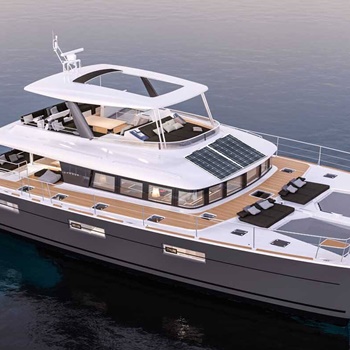 If you want to use a good marine stereo, a refrigerator, lighting system in your boat, these all deplete the battery. You are often required to leave the engine running so that your batteries do not die. However, there is now a solution to this issue. Did you know that many cruise ships use solar panels as well as wind generators to cover their electricity consumption?
If you want to use a good marine stereo, a refrigerator, lighting system in your boat, these all deplete the battery. You are often required to leave the engine running so that your batteries do not die. However, there is now a solution to this issue. Did you know that many cruise ships use solar panels as well as wind generators to cover their electricity consumption?
Marine solar panels are like normal solar panels that gather energy from the sun so that you can make use of the necessary power in your boat. Their most common use is to recharge the batteries and to power the electrical systems in vessels.
How Do Solar Panels Work?
Solar panels work by allowing particles of light, or photons, to free electrons from atoms, thus creating a flow of electricity. A solar panel comprises many, very small units, called photovoltaic cells.
In plain English, this means that they transform sunlight into electricity. To better understand, every photovoltaic cell is like a sandwich made of two slices of semi-conducting material which is usually silicon.
In order to work, these cells have to establish an electric field that is similar to a magnetic field. This one does not use opposite poles, but opposite charges that are separated. To obtain this field, sun panel manufacturers mix silicon with other materials offering the so-called sandwich a positive or negative charge.
Namely, they scatter phosphorus into the silicon, in the top layer, and this adds more electrons with a negative charge. At the same time, the layer from the bottom receives a dose of boron. This results in fewer electrons that produce a positive charge. At the junction between the silicon layers, an electric field is produced.
When a photon of sunlight knocks an electron free, it will be pushed out of the silicon junction by the electric field. A few other components of the cell convert these electrons into usable power. Then, the metal conductive plates of the cells gather electrons and transport them to wires. At this point, these electrons can flow just like any other source of electricity.
Types Of Marine Solar Panels
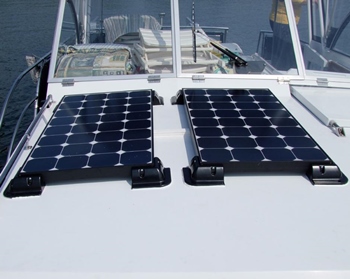 If you got to this part, you are probably pretty serious about getting a solar panel for your boat, or at least want to know more about these devices. Well, you need to understand that there are various types available.
If you got to this part, you are probably pretty serious about getting a solar panel for your boat, or at least want to know more about these devices. Well, you need to understand that there are various types available.
Solar panels can be divided into two major categories, flexible and standard, and into three other categories, based on the technology they use. We are going to discuss each category so you can understand better.
1. Flexible
This type is extremely convenient to use because they are made to bend or be curved. As a result, they can fit any surface and your particular needs. They represent an excellent alternative for small boats, where space is an issue.
Moreover, flexible solar panels are extremely easy to install as they are lightweight and do not have metal backs. However, if you want quality or durability, you should get a more expensive model instead of a cheap one that will not last you very long.
2. Standard
Just like the flexible panels, these also have an aluminum back. However, they are rigid and not at all flexible. Therefore, these panels are recommended for larger vessels, where space is not a problem.
3. Monocrystalline
These panels have the highest efficiency rate in direct sunshine. However, they generate an extremely intricate process of silicon monocrystals. Basically, a group of single cells is gathered together to one solar panel. The panel itself is small, and, therefore, requires less space.
4. Multicrystalline
The efficiency of these panels is about 1 or 2% lower than that of monocrystalline models. They are also called polycrystalline solar panels. Their production costs are a bit smaller because the silicon used is not pure. They are made from single biscuit-like slices of silicon crystals. These panels are cheaper, but they also provide a lower efficiency.
5. Thin Film
Unlike the other two types, thin-film solar panels are made of various materials. The most common type is made from cadmium tellurium. Manufacturers place a layer of this cadmium tellurium between conducting layers that are transparent and can help collect sunlight. These panels are also equipped with a layer of glass on the top for protection.
Another material used for these panels is amorphous silicon. This composition is similar to that of monocrystalline and multicrystalline panels. These units are created by placing non-crystalline silicon on top of metal, glass, or plastic.
Copper Indium Gallium Selenium is also used to make thin-film panels. All four elements are placed between two conductive layers that can be made of glass, steel, aluminum, or plastic. Then, electrodes are put on the front, as well as the back, of the material in order to catch electrical currents.
Marine Solar Panel Buying Guide
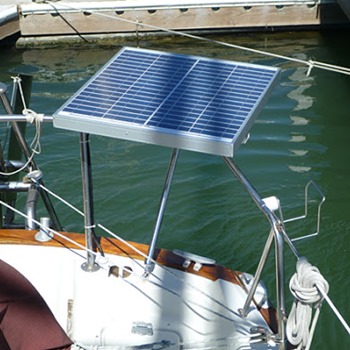 Marine solar panels represent a good option to make sure that the electrical system always has enough power. Therefore, you should include such an item to your boating equipment. However, in order to make a smart investment in a product you can truly rely on, you should keep a few things in mind.
Marine solar panels represent a good option to make sure that the electrical system always has enough power. Therefore, you should include such an item to your boating equipment. However, in order to make a smart investment in a product you can truly rely on, you should keep a few things in mind.
1. Power
Before you do anything else, you need to think about how much power you would need. Different types of marine solar panels generate different amounts of power. If yours does not deliver the necessary amount, your investment is useless. Having too much power is also more expensive than needed.
For example, some boat owners use their solar panels only seldom, to charge their phones or other small electronic devices. Others, however, rely on the panels to run, navigation systems, marine amplifiers, refrigerators, water purifiers, or other similar units.
You should also consider whether you are going to rely on your engine as a power supplement as well. Once you decide how you plan to use your marine solar panel, you can easily figure out how much power you will need.
Basically, what you need to do is add up the wattage requirements of all the devices you want to power up with the panel. Keep in mind that the maximum power of the unit should exceed your estimation.
It is also important to consider your battery’s capacity to handle cloudy days. Depending on your power requirements, you can either get a more powerful solar panel or for more panels that are less powerful.
2. Performance
Since you are going to be in outdoor environments, the performance your solar panel is capable of delivering in various weather conditions is extremely important. Unfortunately, cloudy conditions can drastically affect the efficiency of a solar panel.
In very dark weather, the current generated by your panels can slow down very fast. In these situations, you will need much more power capacity compared to a normal sunny day. You may also need to help your battery by keeping the engine running.
Temperature is another factor that can influence the performance of a solar panel. For example, if you are traveling in a warm climate, the monocrystalline panels are more efficient than multicrystalline units. However, the performance capacity is reversed for these two types in colder temperatures.
3. Size
This is not such an important aspect when you have a large vessel where space is not an issue. However, if the space is limited, the size of the panel is essential as well. Normally, the more energy the boat consumes, the larger the panel you will need.
You should not forget about efficiency either! If you chose a huge solar panel, it does not mean that it is the most efficient. You should try to find a model that is capable of generating a large amount of power and, at the same time, has a small footprint.
4. Type
We are not going to discuss the various types of marine solar panels because we have already dedicated an entire section to this. However, when looking for a product, you should have this in mind.
Different types of solar panels perform differently in various conditions, and you need to keep this in mind before you decide on the type that can serve you best.
5. Resistance and Durability
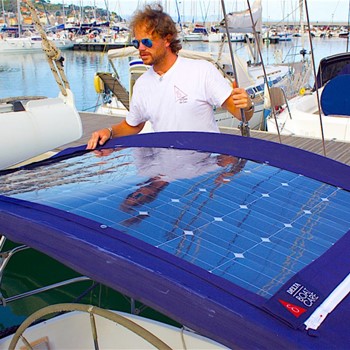 Due to the harsh conditions encountered in the marine environment, you should be careful with what features your solar panel has. For example, you should get a model that is water-resistant. No matter how hard you try to protect it, water is bound to touch it. We are not talking just about rain but about water that splashes and sometimes reaches the panel as well.
Due to the harsh conditions encountered in the marine environment, you should be careful with what features your solar panel has. For example, you should get a model that is water-resistant. No matter how hard you try to protect it, water is bound to touch it. We are not talking just about rain but about water that splashes and sometimes reaches the panel as well.
Moreover, a marine solar panel is not the cheapest item you can get for your boat. Therefore, you should choose a product that is covered by a warranty for at least ten years. Maybe you did not know, but most crystalline panels should last up to 25 years before they need a replacement.
6. Mounting Options
This is another important aspect you ought to consider. Depending on the type of boat you have and its size and available space, a specific solar panel might not be suitable for you. It may have a good size, but the mounting options of the unit might not permit it to be mounted on your vessel.
Therefore, before you decide on a product, think about where you can mount it, and see if the item’s installation requirements match the possibilities offered by your boat.
Moreover, make sure you know what you are doing and that you mount the unit correctly. Follow the manufacturer’s indications, and if you are unsure of anything, call a specialist who can offer professional help.
7. Kits
Another thing you should know is that many manufacturers offer marine solar panel kits. Some of these are extremely helpful because they allow you to install the unit fast and easy. Also, since connecting more panels together may be a hard task if you do not have any skills in this sense, you should look for kits that come with cables.
Furthermore, solar charge controllers are essential for adjusting the power output from your panel in order to protect your battery from overcharging and any other damages. In most cases, getting a kit is also less costly than obtaining all the necessary tools separately, so you should think about this as well.
8. Extra Features
There are marine solar panels available that come with extra features meant to enhance the flexibility of the unit.
For instance, you can get a model that is equipped with a built-in USB charging port which enables you to charge your smartphone without using any additional devices or wiring.
Also, flexible solar panels or foldable models make it much easier to mount pretty much anywhere on your vessel.
How And Where To Install Marine Solar Panels?
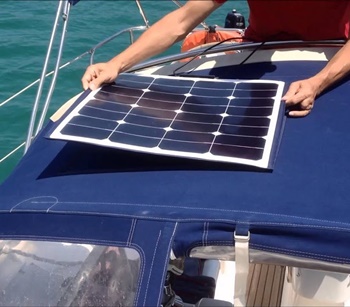 Deciding where to mount a marine solar panel is not always an easy task. Not all boats are the same, so the mounting options in terms of where and how to install a solar panel may differ from one case to another.
Deciding where to mount a marine solar panel is not always an easy task. Not all boats are the same, so the mounting options in terms of where and how to install a solar panel may differ from one case to another.
1. Where?
The most suitable places to mount a solar panel are usually on top of the bimini, on an arch, between two stanchions, on a pole or a rail, on top of dingy davits, or on an arch. Some kits allow flexible panels to be attached to the canvas top.
However, when it comes to flexible solar panels, you should know that they require a sturdy backer board, otherwise, they will fail after a short period. Anyway, it is important to plan these details ahead, depending on the configuration of your boat.
2. How?
Once you find the best spot, make sure you follow the manufacturer’s instructions to the letter. Failing to do so may result in an inefficient panel and you may also lose the warranty, so be careful with this!
You should use tinned marine grade wires because standard automotive wires will lose their conductivity in the marine environment. Also, you need to have a charge controller with settings for your type of battery which will keep it from overcharging.
The positive lead from the panel’s charge controller needs to be fused in order to protect from over-current. Moreover, in case you do not have a battery monitor on board, you should install one or get a controller that comes with a meter.
Maintenance & Safety Tips For Marine Solar Panels
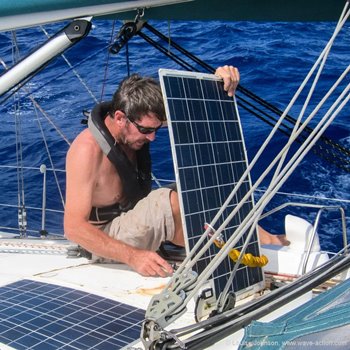 It is extremely important to properly maintain your solar panels if you want it to last for a long time. One of the most important things you should do is to frequently clean it from dust and other particles that land and stay on the panel. If we are talking about large groups of panels, such a task is quite difficult to perform manually.
It is extremely important to properly maintain your solar panels if you want it to last for a long time. One of the most important things you should do is to frequently clean it from dust and other particles that land and stay on the panel. If we are talking about large groups of panels, such a task is quite difficult to perform manually.
For this, you can use a nano-hydrophobic self-cleaning material that is used to cover the panel and maintain its efficiency level high for a long period. Basically, this coating provides a protective barrier that disables water from penetrating the panel and even from sticking to its surface.
However, you still need to clean your marine solar panel. You can do so by using warm water and a mild detergent. Microfiber rugs are great to remove dust and to dry the panel once it is clean. Another thing you should do is check the wires and electrical parts to make sure that they are dry and everything works well. Whenever in doubt, immediately call a technician!
There is an aspect we have not mentioned before: not installing the panel in a correct place might cause the boat to lose its balance. This is a safety tip not only for your investment but for yourself as well. Fortunately, nowadays you can get professional advice and services, so do not hesitate to use them if the situation calls for it.
FAQ About Marine Solar Panels
1. Should I Have Additional Equipment To Use Marine Solar Panels?
If you do not want to get a complete marine solar panel kit, you will need to get a charge controller. This device is designed to protect your battery or batteries from overcharging. Also called regulators, these units are rated by a maximum number of amps in the solar array.
Also, depending on how many batteries you have, you should get a wire for each. Still, make sure you do not use automotive wires as they will lose conductivity very fast in the marine environment. There are tinned marine-grade wires you can use safely.
2. How Much Power Do I Need To Charge Laptops and Smartphones?
A laptop requires different amounts of power depending on how you are using it. If you are working on it, you will need at least 60 watts of power. However, if it is in a standby mode, the requirement is between 15 and 30 watts.
Phones do not require so much power in order to charge. Even if you are using it, you should not need more than 15 to 20 watts. When you are looking for a solar panel for your boat, make sure you add up the power requirements of all the devices you want to power up.
To this sum, add another 10 to 20%. That is the power you will need from a marine solar panel. Still, depending on the weather conditions, you might not always get as much power as you need. But on a normal, sunny day, you should have no issues powering up your electronic devices.
3. How Can I Control The Charging Process Of My Devices?
The best method to control the energy that is being used to charge your batteries is to use a charge controller or regulator. This device is not only inexpensive, but it will also protect your battery from being overcharged and from other possible damages.
4. What Should I Do if My Solar Panel Is Not Charging the Battery?
If you’ve already connected your battery to your solar panel but it does not charge, it is either a battery problem, an incorrect system connection, or an issue with the charge controller settings. It is extremely important for the panel, controller, and battery to be configured correctly.
You can diagnose the problem by measuring the entire system from the battery, charge controller, to the panel using a multimeter. Disconnect the panel and measure the voltage. In case no voltage is detected, there may be an issue with the solar panel.
You also need to measure the voltage of the battery. If it is lower than 20%, you should charge the battery with an extra charger. If both the solar panel and the battery show normal output and voltage, there might be an issue with the controller, and you need to replace it.
However, if you encounter such issues, we strongly recommend that you get in touch with a technician for professional help.
Wrap Up
Solar panels represent an excellent way of getting more power, using less diesel, and protecting the environment, at the same time. In order to find the best marine solar panel, you will need to think about how much power you require for your battery and all your electronic devices, where you will place it, and how you will mount it. In other words, you will need to do a bit of research before deciding the most suitable product.
The good news is that we have already done some of the work for you. Our buying guide, marine solar panel reviews, and all the other information are meant to familiarize you with pretty much all there is to know about these products. If you follow our recommendations, we are sure you will find a unit that will best suit all of your requirements in terms of power on your boat.
Bonus guide: boat grill reviews